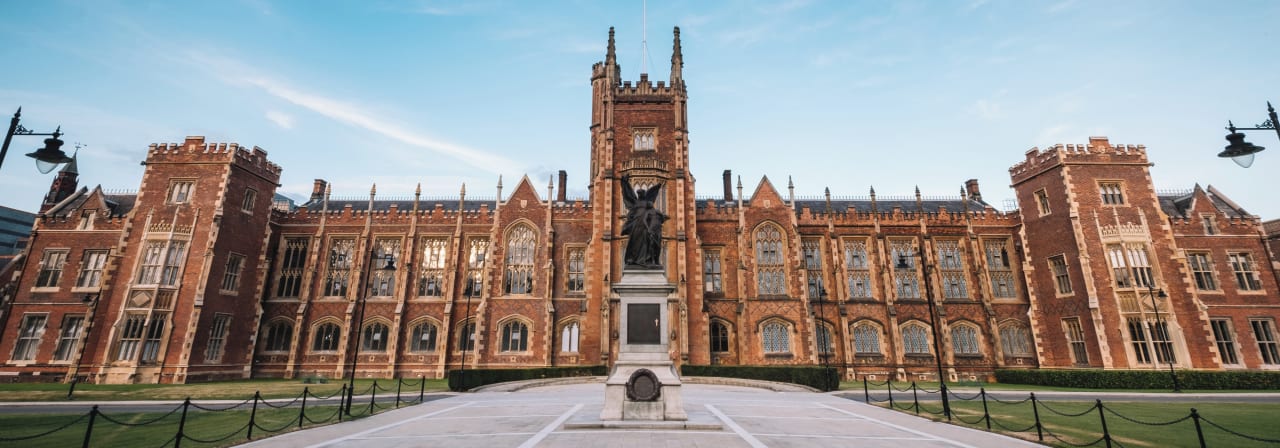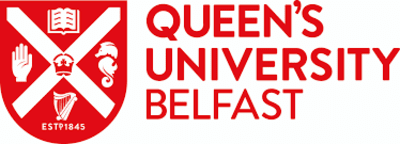
MA Politics
Queen's University Belfast

Key Information
Campus location
Belfast, United Kingdom
Languages
English
Study format
On-Campus
Duration
1 - 3 Year
Pace
Full time, Part time
Tuition fees
GBP 19,100 / per year
Application deadline
Request Info
Earliest start date
Request Info
Introduction
The MA Politics is a broad-based programme, offering students a good grounding in the discipline of political science. This MA gives students the opportunity to engage with core theories, concepts, issues and debates in politics. Students may tailor their programme to their own interests by their choice of optional modules and dissertation, from Irish politics and European politics to political theory and comparative politics, which build on the strengths of the school's research. The master's offers a unique perspective on multi-level politics in Europe, at the regional, national, and European levels and on the policy issues of the time, including energy transitions and climate change, ethnic conflict, gender, and democratic legitimacy.
The aim of the MA in Politics is to deepen students' understanding of important contemporary issues in political studies through the enhancement of students' analytical skills, research and writing talent, and capacity for utilising theoretical approaches. These are all important transferrable skills, highly valued in the job market. The programme is of particular interest to those wishing to know more about Irish politics (North and South), European politics, territorial politics, political conflict, and political theory.
Belfast is a globally significant location and Politics is about conflict, debate and the contest of ideas, making Belfast, where such things are part of everyday reality, an ideal place to study the subject. Northern Ireland is viewed as a model of conflict resolution and peace building across the world.
Students can directly benefit from the School and University’s wider expertise in political theory, comparative politics, Irish and Northern Irish politics, gender and environmental politics, security studies, border studies, terrorism and political violence.
Politics Highlights
Students have the opportunity to visit Brussels (part-funded by the School) including the European Parliament, European Commission, Human Rights NGOs, NATO etc.
World-Class Facilities
- Queen’s was ranked 3rd out of 199 universities worldwide and 2nd out of 44 UK universities for our Graduate School.
- Queen’s is ranked in the top 75 universities in Europe for Teaching Excellent (Times Higher Education, 2019)
- Queen’s is ranked 22nd in the world for international outlook (Times Higher Education World University Rankings 2020).
- Politics was ranked joint 1st in the UK for Research Intensity (Complete University Guide 2021).
- Queen’s currently has over 3,000 international students from 85 different countries.
- Queen’s was ranked 2nd out of 199 universities worldwide for satisfaction with social facilities.
- 11% of the Queen’s student population are international students.
- Queen’s is ranked 1st in the UK for entrepreneurial impact (Octopus Ventures, 2019).
Internationally Renowned Experts
- Students benefit from intensive teaching by a wide and varied range of political scientists and theorists with strong publishing profiles and international reputations in their areas of expertise. Many academics on the programme are engaged in QPOL (Queen’s Policy Engagement) – this is the ‘front door’ for public policy engagement at Queen’s University, supporting academics and policymakers in sharing evidence-based research and ideas on the major social, cultural and economic challenges facing society regionally, nationally and beyond. This includes a Brexit Clinic, with involves Queen’s experts providing insight and analysis into the various facets of Brexit. Many of our experts in this area act as advisors to the UK and NI governments, particularly in relation to the Irish border and the backstop, as the only land border between the UK and EU.
Student Experience
- There are many practical elements embedded in the programme. Examples include the practical modules such as Engaging Citizens in Democratic Institutions – throughout this module, there are visits to the City Council, NI Assembly etc. There is also a trip to Brussels (part-funded by the School) in which students visit for example the European Parliament, European Commission, Human Rights NGOs, NATO etc. We also use a range of assessment techniques, such as writing essays, blogs and policy briefs, where students are presented with a problem and are tasked to come up with practical solutions.
Career Opportunities
All of the Master's programs offered in the School provide our graduates with the skills to pursue a wide range of careers in the private, public, and voluntary sectors. MA Politics graduates are now working in careers with a local, devolved, and national government, policy analysis, and advocacy for NGOs and charities. Many are also in the private sector working as lawyers, in the media, and in management consultancy or public affairs. The MA also provides an appropriate basis for those who wish to proceed to Doctoral-level study.
Queen's postgraduates reap exceptional benefits. Unique initiatives, such as Degree Plus and Researcher Plus bolster our commitment to employability, while innovative leadership and executive programs alongside sterling integration with business experts help our students gain key leadership positions both nationally and internationally.
Graduate Plus/Future Ready Award for extra-curricular skills
In addition to your degree programme, at Queen's you can have the opportunity to gain wider life, academic and employability skills. For example, placements, voluntary work, clubs, societies, sports, and lots more. So not only do you graduate with a degree recognized by a world-leading university, you'll have practical national and international experience plus wider exposure to life overall. We call this Graduate Plus/Future Ready Award. It's what makes studying at Queen's University Belfast special.
Gallery
Curriculum
Course Structure
Students take six taught modules, including compulsory modules in the first semester, which introduce them to the core of the discipline and teach them the skills necessary to conduct research. They must also complete the Dissertation module. Each taught module is worth 20 credits. The Dissertation is worth 60 credits.
The MA offers students the possibility to study a wide range of topics or specialize in Irish politics, political theory, European politics, or comparative politics:
- Irish Politics modules: PAI7022 The Politics of the Republic of Ireland, PAI7021 The Politics and Institutions of Northern Ireland, & PAI7102 Global Ireland
- Political Theory modules: PAI7098 Democratic Challenges & PHL7057 Social Injustice
- European Politics modules: PAI7099 The UK and Europe & PAI7052 Institutions and Policies of the EU
- Comparative Politics modules: PAI7032 Gender, Politics and Democracy, PAI7038 Theories in Comparative Politics, PAI7050 Ethnic Conflict and Consensus, & PAI7100 Engaging Citizens in Democratic Institutions
Other modules are available.
Semester 1 (Autumn)
To acquire foundational knowledge and understanding of Politics, students will take core modules introducing research methods for the study of politics, as well as core issues in the comparative study of territorial politics (devolution, regionalism, and federalism). Students also choose an optional module.
Core modules
- HAP7001 - Approaches to Research Design
- PAI7101 Comparative Territorial Politics
Elective modules
Students must also choose ONE optional module in Semester 1 from:
- PAI7022 - The Politics of the Republic of Ireland
- PAI7098 - Democratic Challenges
- PAI7099 – The UK and Europe
- PAI7038 – Theories in Comparative Politics
- PAI9099 - Dissertation research commences.
Semester 2 (Spring)
Students choose at least two modules from the following list:
- PAI7052 - Institutions and Policies of the EU
- PAI7021 - The Politics and Institutions of Northern Ireland
- PAI7032 - Gender, Politics, and Democracy
- PAI7100 – Engaging citizens in democratic institutions
- PHL 7057 Social Injustice
and
Students choose one module from the following list (if necessary):
- PAI7102 Global Ireland
- PAI7030 – International Political Economy
- PAI7036 - The Politics and Political Economy of Energy and Low Carbon Energy Transitions
- PAI7050 - Ethnic Conflict and Consensus
- PAI9099 - Dissertation research continues.
Summer
PAI9099 - Dissertation (15,000 words maximum)
Learning and Teaching
Most modules are taught through seminars, which combine short lectures, class discussions, group work, and other in-class activities. The class size is around 15-20 students. Our Virtual Learning Environment also provides opportunities for online activities such as discussion groups, reading groups, and quizzes (uses vary between modules).
Cognitive Skills
At the end of the program, learners will have the capacity to be self-reflective and practice sound judgment and will possess the necessary skills to enhance their ability, think critically, and pursue independent research.
Provides learners with the opportunity to develop generic analytical, reasoning, literacy, and communication skills.
Provides learners with the ability to solve problems, process and prioritize a wide variety of information, and express arguments and positions in oral and written form.
The learner will develop their basic knowledge of the general methodological and theoretical approaches of Politics as well as enhance their basic history of the discipline and knowledge of its specific concepts, issues, and vocabulary.
At the end of the program, learners will have the capacity to be self-reflexive and practice sound judgment and will possess the necessary skills to enhance their ability to think critically and pursue independent research.
Knowledge and Understanding
To equip students with a set of key, subject, employability, and transferable skills; to encourage a professional attitude towards self-organization, and to provide students with the intellectual tools to reflect upon the subject of Politics both by theoretical explorations of the nature of Politics and by comparison between societies.
Provides students with a knowledge and understanding of core debars in the subject and fosters an attitude of self-motivated and independent learning.
It enables students to research political phenomena, events, and arguments/ideas.
Provides a grounding in the key issues in contemporary politics and normative theory, British Politics, Irish Politics, European Politics, International Relations Policy, and Comparative Ethnic Conflict (depending on the modules chosen).
Subject Specific Skills
Able to evaluate different interpretations of political issues and events.
Demonstrate knowledge and understanding of different political systems, the nature and distribution of power in them; the social, economic, historical, and cultural contexts within which they operate, and the relationships between them.
Apply concepts, theories, and methods used in the study of politics to the analysis of political ideas, institutions, and practices.
Understand the nature and significance of politics as a human activity.
Assessment
Assessments associated with the course are outlined below:
- Essays
- Learning Journals
- Presentations
- Examination
- Portfolio projects, including blog posts
- Continuous assessment
- Policy briefs/papers
Admissions
Program Tuition Fee
Scholarships and Funding
How do I fund my study?
The Department for the Economy will provide a tuition fee loan of up to £6,500 per NI / EU student for postgraduate study.
A postgraduate loans system in the UK offers government-backed student loans of up to £11,836 for taught and research Master's courses in all subject areas. Criteria, eligibility, repayment, and application information are available on the UK government website.
International Scholarships
English Language Requirements
Certify your English proficiency with the Duolingo English Test! The DET is a convenient, fast, and affordable online English test accepted by over 4,000 universities (like this one) around the world.